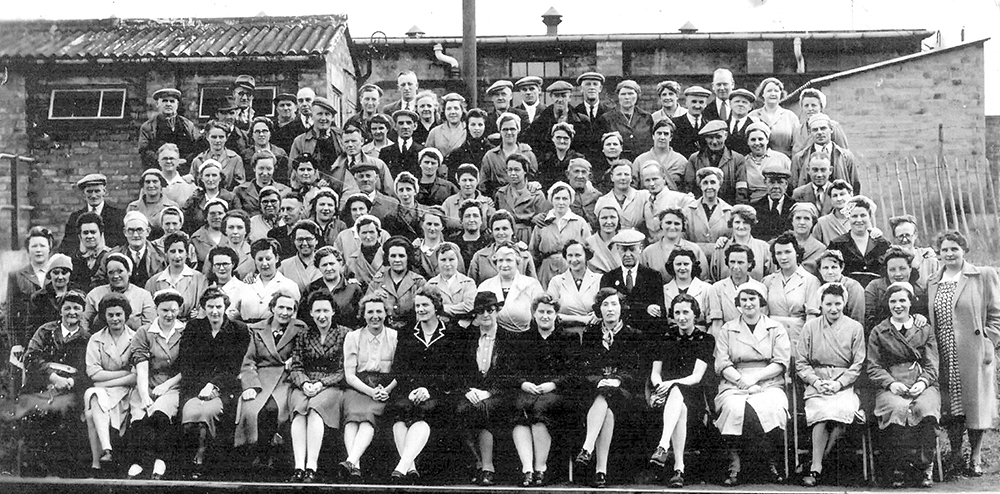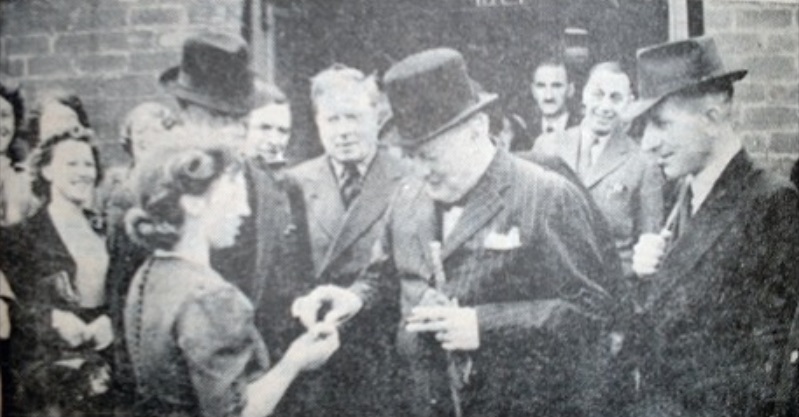
In 2004, Northern Echo community web editor, Andrew Hutton, forced the ‘Aycliffe Angels’ onto the public stage in a much-needed campaign for recognition.
The Royal Ordnance Factory (ROF) had of necessity been as shrouded in secrecy as it had been shrouded in the Aycliffe mists which protected it from bombing raids. People in County Durham – even those living nearby – were generally unaware what went on behind its high barbed wire fences … so much so that one young Angel’s mother could become annoyed that the ROF did not provide fires for its workers in cold weather!
The Angels’ work was secret, so there were no wartime photos of the site, few newspaper reports, no demob fanfare at the end of it all … and no national recognition of the kind that was accorded to such as the Land Army and the Bevin Boys. It was this that Hutton and the Echo successfully redressed, culminating in a national service of remembrance at Coventry Cathedral in 2000 attended by the Queen and the Prime Minister. Since then there have been further acknowledgements of the Angels’ contribution to the war effort, though falling short of the national medal the campaigners sought.
THE NORMAL STORY OF THE ANGELS
Popular articles about the Aycliffe Angels – usually featuring the memories of one or more of these amazing women – tend to follow a pattern. They start with a description of the ROF and its importance to the war effort; they reference the danger of the work; but then they cap the article with a positive reflection. In this, moreover, they are supported by the Angels themselves: ‘’Happy days and happy memories”reads the back of a group photo donated to the Town Council. Similarly, the Angels interviewed by Greenfield students in 2005 shared, (e.g.): “We used to have a laugh and used to hear different tales and what they used to do, going to dances and getting into mischief, and it was really a happy time – I really enjoyed it”.
There is no doubt that there was solidarity and comradeship. Relative to other jobs for young women, the wages were good. There was a full-time Entertainments team on site organising concerts and events such as trips to the seaside. Gracie Fields came to perform. And – as all workers – the Angels well capable of ‘having a laugh’ at work: including, rather darkly, according to one Angel, lying under a blanket and trying to convince the supervisor that there had been an accident. In 2005 Korczynski et al. evidenced the importance of singing for the workers: “We sang ourselves through that war”.
THE REALITY OF THE ROF
But it would be wrong to focus too much on the fun of the factory, and the humility of the Angels – more than half-a-century after the events – to play down the dangers as “a thing we had to do and everyone just got on with it”. To do so is to undervalue the hardship, stress and frequent accidents to which these women sacrificed a formative part of their younger lives.
In addition to the newspaper fanfares, there have been a number of serious oral history studies of the Aycliffe Angels. In the late 1980s Professor Richard Brown interviewed more than 70 Angels for his work on the gender issues of paid labour during the war, and in 2007 two Canadian academics talked to a number of Angels as part of their research into how people doing dangerous jobs are able to cope and even thrive.
Academic studies such as these have revealed truths about the reality of the ROF that show a different side to the ‘happy singing heroines’ we read about in the press.
NOT A NICE PLACE
TO WORK
For a start, the ROF was not a nice place to work. “Even on a nice day it still looked what a prison would look like, and when it was wet and the wind was howling – dreadful!” In a letter to the Treasury in November 1944 Douglas Jay, President of the Board of Trade, described the buildings as “unfit for general purposes”. No windows in most of them … and we have already seen that many were (for obvious safety reasons) unheated.
Many of the overwhelmingly female workforce travelled in from all over Durham, an arduous journey on often unreliable transport – starting at 4:30am for the day shift, and going home in the early hours for the night shift. One Angel remembered having a weekend off every three weeks. More than half the women at the ROF were married with young children, but there was no nursery or crèche at Aycliffe as at some government factories; those of us who have been complaining because we have run out of butter in the current lockdown might pause for a while consider the situation of these women who – with their husbands away at war – were running the home alone whilst working shifts, finding child-minding out of their wages, and feeding their families (on rations) despite setting off for work before the shops opened, and arriving home after they closed.
On arrival, the women were frisked in the ‘sifting house’ for matches, hair grips or anything else that could cause a spark; they were told to hang things like rings in a cloth bag round their neck.
The work was repetitive and boring. One woman’s job, for example, for the entire length of her 8-hour shift, was to check with a gauge the width and length of shell casings: “soul-destroying” was how she described it. “I wouldn’t say I was sorry to leave,” commented another Angel to the Imperial War Museum Sound Archive. “I think it was too monotonous the work for me.” No wonder they sang while they worked!
To make things worse, the only ‘training’ the girls were given was a quick briefing on how to do the specific task allotted to them – plus they were frequently moved from factory to factory to plug gaps on assembly lines – so they never saw the process from beginning to end, and thus never appreciated the value of their work within that process.
UNDERVALUED AND LOOKED DOWN UPON
The judgement of Selina Todd, who reviewed the interviews for her 2005 book on young women and work, was that: “a large number of women who worked at Newton Aycliffe Royal Ordnance Factory … were negative about their experiences”. They were integrated into the workforce in a very controlling way, usually in non-managerial roles. Worst of all, in a society still dominated by middle class values, although the Angels were central to wartime production, their ‘betters’ were scandalised by their off-duty (and sometimes on-duty) sexual behaviour, and they “were frequently treated as a social and moral problem by social investigators and policy makers when they refused to conform to a stereotype of self-sacrifice”.
Winston Churchill visited in 1942, but of the female workforce the newspapers reported only that “pretty 21-year-old Miss Gladys Stoddart is likely to be known among her fellow workers and at the nearby hostel as ‘the girl that kissed Churchill’…” after she presented him with a cigar and gave him a peck on the cheek. In a comment to set back women’s rights by decades, Gladys told the Northern Echo: “I was so excited that I scarcely knew what I was saying”.
Thus undervalued, the women who took over the jobs of the men who were away fighting sometimes reacted in ways that break our comfortable image of the ‘inspirational home-front heroine’. Some of the oral records reveal negativity, work-avoidance, and even tap-dancing to the piped music when they should have been working. Kitty Burn boasted to the IWM Sound Archive that, annoyed by a disciplinary meeting to address her absenteeism, she stomped off to the doctor “and got a permanent sick note. So after that every time, whether I had a nose bleed or not, I took the sick note in and there was nothing they could do about it [laughs]”.
Even the singing was not as innocent as it seems! Workers genuinely joined in with patriotic songs and Vera Lynn, but some ended the day with a chorus of ‘[Nasty word] Britannia’. One of the songs was a watchword to warn that the ‘danger man’ [one of the Danger Building Inspectors] was on his way; and workers were well aware that singing while they worked gave their work a rhythm (a “swing”) which increased production … and produced a much-needed bonus on their wages.
THE ACHIEVEMENT
Women’s work during the war, certainly at Aycliffe, unarguably helped to win the war. But did it accomplish anything for women?
For the (overwhelmingly male) historians of the 1960s and 1970s, the answer was yes. They saw – in the successful taking on of roles previously labelled as ‘men’s jobs’, and in the social freedom that a job and money-in-their-pockets created – an ‘emancipation’ which ‘allowed’ women to enter the workforce after the war.
The (often female) historians of the 1980s thought differently. Conducting oral interviews such as those with the Aycliffe Angels, they reinterpreted women’s war work in terms of the Marxist concept of an oppressed ‘reserve army of labour’, there at the beck and call of the capitalist system, to be used and dumped as necessary to keep the wheels of industry turning. Women they said, were called up only because they were needed and, after the war, married women were encouraged to return to domesticity to release a job for the returning soldiers … whilst, by the way – because there was still a shortage of workers – unmarried women continued to be recruited. The dubious reward for their war contribution, feminist historian Penny Summerfield suggested, was a ‘double day’ of low-paid, menial ‘5 Cs’ work (cleaning, catering, caring, cashiering and clerical) during the day … on top of the housework when they got home at night.
You may be relieved to hear that modern historians such as Selina Todd tend to think that, taken as a whole, young women *did* gain something from their war work, because it broke the traditional patriarchal family bonds, released them socially, and gave them confidence. Many of the ROF Angels might have gone straight into marriage-and-family, but the following 1950s cohort of their younger sisters broke the mould.
So it seems that we owe the Aycliffe Angels – not the paragon-Angels of myth, but the human-being-Angels of reality – a great debt … not least, of course, the town we live in.
John D Clare











